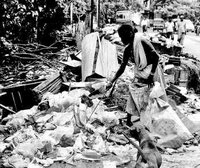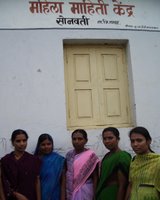
The Hindu, Sunday, January 29th 2006
THEY deftly distinguish between various types of plastic, glass and paper; they charter toxic, dangerous terrain with no protection other than the clothes they wear. Daily, they increase the value of their work material multi fold; their work saves taxpayers over Rs. 10 crores each year.
Yet they are not highly paid scientists or academics involved in cutting-edge research. They are the waste picker-women of urban India, identified by their unruly, matted hair, white gunny bags slung over their bent backs, and their torn, dirty saris. Across the socio-economic spectrum, their presence is usually met with disgust, and often, scorn.
Valuable services
This is unfortunate because waste pickers, despite the inhuman conditions in which they work, perform extremely valuable services for society. Their work aids in the reduction of handling and transport costs of waste; they save municipalities lakhs of rupees each year. They recover material from places where few dare to venture and supply raw material to recycling factories, thereby saving space at the dumping ground and also helping protect the environment. They collect biodegradable waste from households and produce rich compost. Their work directly impacts our lives in ways that many fail to notice: can we imagine how dirty our streets would get if waste pickers stopped collecting trash?
However, the contribution of waste pickers — most of whom are women — to our society is not well known or appreciated, and their plight has been all but ignored by the Government. "The State Government does not take cognisance of the benefits that these women bring to society," says Jyoti Mhapsekar, founder of Mumbai-based Stree Mukti Sanghatana (SMS), that has pioneered efforts to improve the lives of waste picker-women through its programme Parisar Vikas. "Waste pickers are the poorest of the poor in our country, yet there are few avenues available to help them improve their work and life conditions," she adds.
In a study of 1,000 waste pickers conducted by SMS in Mumbai, they found that 85 per cent of the waste pickers were women, 90per cent of whom were the primary breadwinners in their families. Many were widows or had been deserted by their husbands; the majority of those married had husbands who were alcoholic and unemployed. Nearly all were illiterate, with no alternative skills. The study also found that in addition to themselves, waste pickers often had to support children, parents and extended family members.
Exploitation by middlemen is a major challenge they face. After collecting and sorting the dry waste from the dumpsite, they sell the sorted waste to middlemen who offer them only a few rupees per kg. The dry waste is then passed to the hands of various other middlemen, its value increasing multi fold every step of the chain, until it finally reaches the recycling factories where, says Mhapsekar, "it is sold at the price of gold". Waste pickers are forced to accept the low prices offered by middlemen because they have no alternatives for generating money, and are unaware of the value of the sorted waste. In addition, they are dependent on these middlemen who often act as moneylenders, accountants and advisors. "Though recycling factories operate on the hard work of these women, the women get peanuts, while the middlemen quite literally become millionaires," says Mhapsekar.
Combat exploitation
To combat the exploitation faced by waste picker-women, SMS has established various programmes to increase their bargaining power and social organisation. Microsaving schemes encourage women to build the habit of saving; micro credit schemes allow them the financial security to make business decisions to improve their situations. The provision of autorickshaws to the women enables them to cut out the `transportation middlemen' from the chain, thereby sizably increasing the women's profits. Additionally, SMS has lobbied to secure direct waste-collection contracts with residential establishments and with the Mumbai municipality, thus allowing women to have access to more valuable and less-dangerous household waste.
Though household waste is the most desirable option among different types of waste, organized networks of men usually dominate residential contracts, with most waste picker-women being relegated to the dumpsite. "At the dumpsite, every kind of waste is mixed together: medical, industrial, chemical and household waste. As a result, sorting the valuable waste is not only difficult, it is extremely dangerous," explains Mhapsekar. Injuries from glass and metal pieces, acid bottles, needles and animal bites are common. Certain kinds of chemical waste, when exposed to sunlight, give off dangerous gases, which are highly flammable and cause respiratory diseases. "Sometimes men light their bidis atop the mounds, setting miles of waste on fire," she adds.
Quality of life
Recognising the importance of health, training and education in improving the quality of life of the waste pickers, SMS regularly holds health camps for women and children along with workshops on topics such as disease, sexuality and women's special health needs. Trainings on biocomposting, vermiculture and gardening have enabled nearly 250 former waste pickers to gain alternative employment. SMS also organises awareness-raising sessions for children of waste pickers on issues such as adolescence, drug de-addiction and value-education.
They have initiated various education programmes for girl-children of the waste pickers to enable them access to employment options other than waste picking.
Despite the enormous challenges in its path — threats from middlemen, apathy of the government, extreme poverty and ignorance of women, to name a few — SMS has succeeded in building an innovative, successful model for waste treatment. "We are happy that numerous organisations from around the country have replicated our model in their localities," says Mhapsekar. Perhaps a major reason for Parisar Vikas' success has been its dogged pursuit of collaboration with the government, private sector and ordinary citizens, as a result of which they have been able to land key contracts with municipalities and waste treatment plants. Their efforts have greatly expanded the horizon of employment and learning opportunities for waste picker-women. "The work of Parisar Vikas," concludes Mhapsekar, "highlights the reality that women from marginalised groups need not be passive victims of poverty and human rights violations; they can successfully participate in the struggle to survive, to gain control over economic, social and political resources, and lead a life of dignity."
Send comments to the writer at: smitainasia.blogspot.com
Read the article at: http://www.hindu.com/mag/2006/01/29/stories/2006012900150400.htm
